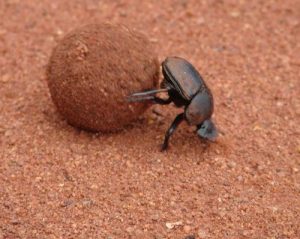Confessions of a Dung Beetle
July 6, 2018
Stillwater, Oklahoma
For the last twenty or so years I have been calling myself, and the students who work with me, Dung Beetles.

(This image stolen from somewhere on the Internet)
Trained as an engineer, I am employed as a teacher at a Land Grant University on the Southern Plains – a public servant in the Cooperative Extension Service. Like the Dung Beetle, my career and energy are dedicated to making something useful out of the organic detritus of man and his industry.
My old teachers might be amazed that I am an engineer. Most of them told me I should be a writer. (My 9th grade English teacher said I should become an actor, but I don’t think she meant it as a compliment.)
But, I have always been fascinated by the interdependence of life, decay, and renewal. I recall one afternoon when I was nine or ten, digging through the pine needles collecting between rocks. The deeper I dug, the more the needles began to resemble soil. I also noticed little creatures making the organic mat their home. It was one of those rare moments when you see that everything fits together — trees drop their leaves, leaves decay, trees absorb nutrients from the decaying leaves, trees grow more leaves. Given that this epiphany occurred on the outer edge of the Fourche Mountains of Arkansas, and accumulating duff is actually detrimental to the perpetuation of the Short Leaf Pine /Big Bluestem ecosystem is beside the point:
Passion comes first. We fill in the blanks later.

Ouachita Mountains Shortleaf Pine – Big Bluestem Woodlands (Reed Noss, www.southeasterngrasslands.org)
My passion for the cycle of life continued through my teens. I was interested in the usual things: girls, sports, etc., but anyone would tell you I was different. I distinctly remember waiting for the school bus one morning, absorbed with the idea of returning sewage sludge (it wasn’t called biosolids in the late 70s) to the land to grow crops.
I was inspired by my high school chemistry teacher to pursue a degree in Engineering – Chemical Engineering at first, then later Agricultural Engineering. We call ourselves Biosystems Engineers now, but I have always embraced the agriculture part of our profession. Even though I grew up in Little Rock, my father was always interested in farming. He was kind of a Mr. Douglas wannabe for those of you old enough to remember Green Acres. Somehow, though, I felt I needed to justify my existence as a city kid in an Aggie field, so I came up my mantra:
“If a guy works on both ends of the digestive system, he may not get rich, but he will always be employed.”
And I was right. Outside of a few months of voluntary unemployment here and there, I have never been without a job for the last 35 years.

Paul Writing in Prison by Rembrandt van Rijn
So, after many years working in the dung beetle business, I am returning to my roots as a writer with this blog – the Dung Beetle Diary. What I hope to accomplish is to bring the wisdom of the dung beetle, gathered through eons of backwards rolling of feces, to mankind. I am sure I will attract readers from the same old crowd of academics, farmers, extension agents, and government agency folks.
But, who I really hope to reach is the otherwise unconvinced public. Some may be attracted by the sheer adolescent joy of grossness. After all, Mike Rowe has made pretty good living doing dirty jobs. Hopefully, the blog readers of the world will be fascinated by the carryings on of us folk who work in this new-called field of Biosystems Engineering. Perhaps I will relive the time when a fellow Little Rocker I knew in college (a graphic artist) started looking at me strangely as I described my future master’s thesis research.
“What, you think my work is disgusting?” I asked
“No.” He replied. “I can’t believe anyone actually studies that sh**.”
His words exactly.